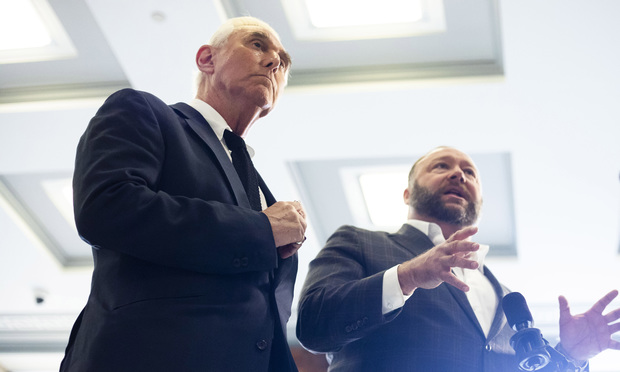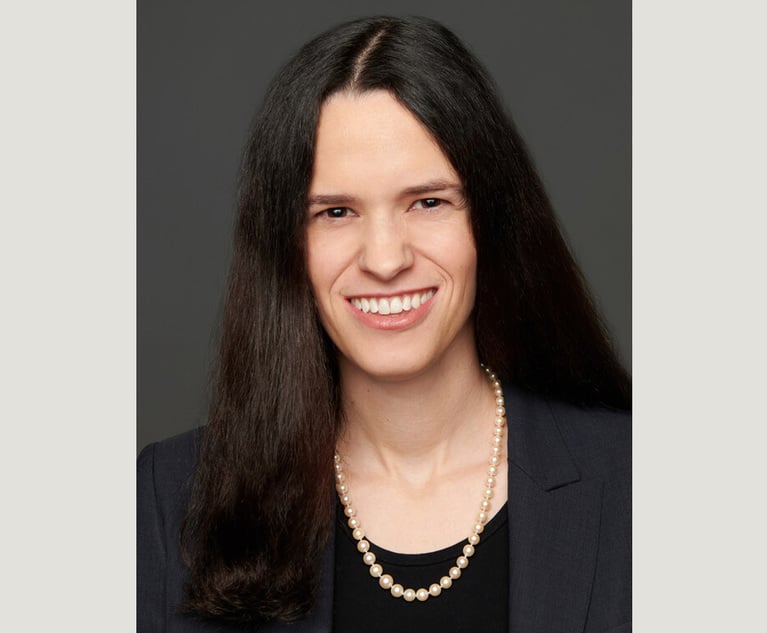Prison, Probation or Pardon: How Roger Stone's Sentencing Became Bigger Than Roger Stone
A week and a half of drama surrounding Roger Stone's future will come to a head Thursday when Judge Amy Berman Jackson imposes her sentence.
February 19, 2020 at 11:19 AM
6 minute read
 Roger Stone (left) and Alex Jones (Photo: Diego M. Radzinschi/ALM)
Roger Stone (left) and Alex Jones (Photo: Diego M. Radzinschi/ALM)
Thursday's sentencing of Roger Stone, the longtime Trump ally who often took on a bigger-than-life personality, has now become a case that's bigger than Stone.
In the past week and a half, Stone's sentencing has become a forum for accusations of political interference by the Trump Justice Department, the final straw for at least one career prosecutor at the U.S. Attorney's Office for D.C. and the topic of many tweets from President Donald Trump.
Speculation around a presidential pardon has also gained steam, amid other pardons Trump handed down this week.
What Stone's sentence ultimately ends up being is in U.S. District Judge Amy Berman Jackson's hands. During a scheduling conference on Tuesday, she was unwilling to delay sentencing after Stone's defense team filed a second motion for a new trial under seal, noting it "had already been put off once."
"I think delaying the sentencing would not be the prudent thing to do," she said on the phone conference. None of the parties were in the room.
Not mentioned at the conference were the myriad other topics surrounding the sentencing. Stone's case has served as a conduit for questions about the Justice Department's handling of politically sensitive criminal cases under Attorney General William Barr, including that of Trump's former national security adviser Michael Flynn.
In the Stone case, the original line prosecutors who obtained the guilty verdict all withdrew from the case after Main Justice announced it would step in and recommend a lighter sentence than the seven to nine years they requested in their original sentencing memo. One prosecutor, Jonathan Kravis, resigned as an assistant U.S. attorney altogether.
The new DOJ sentencing recommendation in Stone's case says he should be incarcerated for an unspecified amount of time but less than the seven to nine years. Stone's attorneys have said their client does not require incarceration as a part of his sentence.
Stone's is represented by a Fort Lauderdale, Florida-based team of attorneys, including Bruce Rogow and Robert Buschel.
The decision to suggest a lower sentence echoed a move made weeks earlier in the Flynn sentencing, in which prosecutors asked he be sentenced to prison, more than they had asked for one year earlier. In a later filing, they said probation also would be acceptable.
Stone's case itself was a whirlwind from the start: It began with a gag order, then Stone violating the gag order, Jackson repeatedly ruling against Stone legal team ahead of the trial, and Stone again violating the gag order heading into trial.
After the jury returned a guilty verdict, attention shifted to DOJ. Once Trump weighed in on Twitter to say the government's recommended sentence was too harsh, DOJ changed its sentencing recommendations, sparking fears of political interference. Attorney General William Barr, though, said the decision to change the sentencing recommendation was made before Trump took to Twitter.
Those recent allegations of political interference have dominated more talk of Stone's case than the facts of the charges themselves: Lying to the House Intelligence Committee as part of its Russia probe, impeding a congressional investigation and witness tampering.
The witness stand and exhibits during his November trial was a who's who of former top Trump campaign officials. Steve Bannon and former deputy campaign chairman Rick Gates testified, and texts between Stone and Trump surrogate Erik Prince were inserted into the record alongside phone records for numbers associated with Trump.
Adding onto the sense of surreality was the testimony of Randy Credico, a radio host who Stone had initially told congressional investigators was his back channel to WikiLeaks. Credico spent much of his first day on the stand cracking jokes, earning him a reprimand from Jackson.
Stone's defense team was relatively quiet in the time between the jury returning its guilty verdict in November and last week's sentencing memos.
One of Stone's lawyers, Chandler Routman, left the case last month. Last week, Stone tapped Seth Ginsberg, who previously represented alleged mafia figures like John Gotti Jr. and an alleged member of the Luchese crime family.
Ginsberg took the lead in arguing for Stone's sentencing to be delayed during Tuesday's hearing, acknowledging that no case law exists that required Jackson to rule on the motion for a new trial before the sentencing, while adding it would be "appropriate" for her to do so anyway.
At the same time, outside groups have spoken in defense of the original line prosecutors on the Stone case and against Barr and his running of the Justice Department.
The National Association of Assistant U.S. Attorneys defended the prosecutors in a statement last week, saying they had done "nothing wrong or improper." And a letter from former DOJ officials calling on Barr to resign has gained more than 2,000 signatures.
Others are also coming to the defense of Jackson, who has been targeted by Trump on Twitter in recent days. District of Columbia Chief Judge Beryl Howell said Jackson's sentence will be based on a number of criteria, but "Public criticism or pressure is not a factor."
The Federal Judges Association also will hold an "emergency meeting" on the Stone case on Wednesday.
Regardless of what Stone's sentence is, the possibility of Trump issuing a pardon hangs over the case.
The president announced a slew of commutations and pardons on Tuesday, including a commutation for former Illinois Gov. Rod Blagojevich. He told reporters at the time that he had not considered a pardon for Stone.
When asked if he thought Stone would serve any time in prison, Trump declined to weigh in. "You're going to see what happens," he said.
Read more:
DOJ's Roger Stone Debacle Puts New Focus on Judge Amy Berman Jackson
'A Loss to the Pursuit of Justice': Praise for Roger Stone Prosecutor Who Resigned
This content has been archived. It is available through our partners, LexisNexis® and Bloomberg Law.
To view this content, please continue to their sites.
Not a Lexis Subscriber?
Subscribe Now
Not a Bloomberg Law Subscriber?
Subscribe Now
NOT FOR REPRINT
© 2025 ALM Global, LLC, All Rights Reserved. Request academic re-use from www.copyright.com. All other uses, submit a request to [email protected]. For more information visit Asset & Logo Licensing.
You Might Like
View All
In-House Moves of the Month: Boeing Loses Another Lawyer, HubSpot Legal Chief Out After 2 Years
5 minute read
After Regime Change, Syria Remains Liable in US Federal Courts for Alleged Assad-Era Terrorism Support
3 minute read

Split 4th Circuit Ruling Is a Win for Covington & Burling in US Army Base Attack Litigation
3 minute readTrending Stories
- 1Data Disposition—Conquering the Seemingly Unscalable Mountain
- 2Who Are the Judges Assigned to Challenges to Trump’s Birthright Citizenship Order?
- 3Litigators of the Week: A Directed Verdict Win for Cisco in a West Texas Patent Case
- 4Litigator of the Week Runners-Up and Shout-Outs
- 5Womble Bond Becomes First Firm in UK to Roll Out AI Tool Firmwide
Who Got The Work
J. Brugh Lower of Gibbons has entered an appearance for industrial equipment supplier Devco Corporation in a pending trademark infringement lawsuit. The suit, accusing the defendant of selling knock-off Graco products, was filed Dec. 18 in New Jersey District Court by Rivkin Radler on behalf of Graco Inc. and Graco Minnesota. The case, assigned to U.S. District Judge Zahid N. Quraishi, is 3:24-cv-11294, Graco Inc. et al v. Devco Corporation.
Who Got The Work
Rebecca Maller-Stein and Kent A. Yalowitz of Arnold & Porter Kaye Scholer have entered their appearances for Hanaco Venture Capital and its executives, Lior Prosor and David Frankel, in a pending securities lawsuit. The action, filed on Dec. 24 in New York Southern District Court by Zell, Aron & Co. on behalf of Goldeneye Advisors, accuses the defendants of negligently and fraudulently managing the plaintiff's $1 million investment. The case, assigned to U.S. District Judge Vernon S. Broderick, is 1:24-cv-09918, Goldeneye Advisors, LLC v. Hanaco Venture Capital, Ltd. et al.
Who Got The Work
Attorneys from A&O Shearman has stepped in as defense counsel for Toronto-Dominion Bank and other defendants in a pending securities class action. The suit, filed Dec. 11 in New York Southern District Court by Bleichmar Fonti & Auld, accuses the defendants of concealing the bank's 'pervasive' deficiencies in regards to its compliance with the Bank Secrecy Act and the quality of its anti-money laundering controls. The case, assigned to U.S. District Judge Arun Subramanian, is 1:24-cv-09445, Gonzalez v. The Toronto-Dominion Bank et al.
Who Got The Work
Crown Castle International, a Pennsylvania company providing shared communications infrastructure, has turned to Luke D. Wolf of Gordon Rees Scully Mansukhani to fend off a pending breach-of-contract lawsuit. The court action, filed Nov. 25 in Michigan Eastern District Court by Hooper Hathaway PC on behalf of The Town Residences LLC, accuses Crown Castle of failing to transfer approximately $30,000 in utility payments from T-Mobile in breach of a roof-top lease and assignment agreement. The case, assigned to U.S. District Judge Susan K. Declercq, is 2:24-cv-13131, The Town Residences LLC v. T-Mobile US, Inc. et al.
Who Got The Work
Wilfred P. Coronato and Daniel M. Schwartz of McCarter & English have stepped in as defense counsel to Electrolux Home Products Inc. in a pending product liability lawsuit. The court action, filed Nov. 26 in New York Eastern District Court by Poulos Lopiccolo PC and Nagel Rice LLP on behalf of David Stern, alleges that the defendant's refrigerators’ drawers and shelving repeatedly break and fall apart within months after purchase. The case, assigned to U.S. District Judge Joan M. Azrack, is 2:24-cv-08204, Stern v. Electrolux Home Products, Inc.
Featured Firms
Law Offices of Gary Martin Hays & Associates, P.C.
(470) 294-1674
Law Offices of Mark E. Salomone
(857) 444-6468
Smith & Hassler
(713) 739-1250










